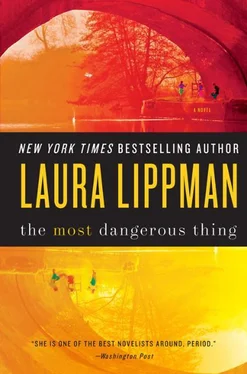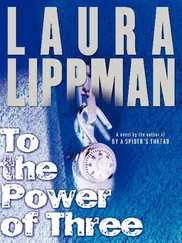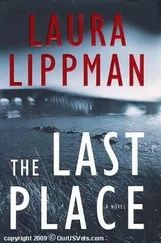His brothers, who had been following the parade on their bikes, circle back, riding in slow, lazy circles around them.
“Let’s take turns,” Sean says. “We can go faster than you.”
“He’s too big for you to carry.”
“Not for me and Tim together.”
They leave their bikes by the side of the road-no need to fear them being taken here in Dickeyville, where everyone knows everyone, although some colored kids might come along. The brothers make a seat of their hands and carry Go-Go the next block. Tim then takes him back on his shoulder for a segment. And so they go, now part of the parade. But for the final stage, for the approach to the finish alongside the stream, Go-Go wants to get back on his father’s shoulders and do his hand thing again. This time, Sean carries the hockey stick.
They’re all dripping with sweat, smelly and disgusting. But the woman who frowned at Tim’s can of Schaefer smiles at him now. He smiles for himself. Go-Go wins second prize-really, it should have been first, just for the sheer stamina involved-but he’s pleased as hell with the ten-dollar gift certificate to G. C. Murphy’s and the look on his face is more than enough reward for Tim. Even with Tim back at work, things are still lean for the family.
Go-Go must understand this because later that night, after running through a list of all the things a boy can do with ten dollars at G. C. Murphy’s, he offers to put it toward school supplies.
“That’s okay, buddy,” his father says, tucking him in, something he seldom does in the summer, when the boys are allowed to stay up as late as they wish. Something he seldom does, period. “It was your costume, you get the prize, spend it on whatever you want. Where’d you get the idea?”
“I found a hockey mask.”
“Where did you find a hockey mask?”
“In the woods.”
“In the woods. I thought we agreed you weren’t going to go into the woods alone.”
“At the end, in the vacant lot on Tucker Lane. Not in the woods -woods.”
“OK. So you found a hockey mask, just lying there?”
“Yeah. At first I was going to be the killer in Friday the 13th . I didn’t get to see it, but Sean and Tim told me about it.”
“That wouldn’t have been a very nice thing to be on the Fourth of July, buddy. It’s your country’s birthday.”
“I know. Besides, that would mean I was a girl because in the movie, it’s a lady who wears the hockey mask so people don’t recognize her when she’s killing them. I don’t want to be a lady.”
“Of course you don’t. You’re a boy. You’re all boy. And what you did, that was better. Jim Craig-that’s in the right spirit.” A pause. “Where’d you get all the other gear, buddy? The stick and the pads?”
“Oh, some boys lent it to me.”
“Really? What boys?”
“I have to give it back. Not the skates. I wore my own skates. Do you remember when you taught me how to skate?”
Go-Go’s memory is generous. Tim didn’t exactly teach him how to skate. He left that to the older boys. He does remember the rink at Memorial Stadium, a bone-cold frustrating day of Go-Go walking on his ankles. Tim hated every second of it and kept retreating to the car to “get warm” and listen to the Colts playing out of town. Turns out that all that walking on his ankles had prepared Go-Go well for today. “Yeah, I remember.”
“That was a good day.”
“If that was a good day, then I guess today is a fantastic day.”
“Yeah.” Go-Go frowns. “It is, but it doesn’t feel quite the same. Things aren’t as good as when I was little.”
That fuckin’ freak in the woods . For all Tim knows, that monster gave Go-Go the hockey mask last summer, that’s how he lured him into his house. That man took his boy’s childhood and there’s not a damn thing Tim can do about it. Talking makes the least sense, he doesn’t care what anyone says. Nothing can undo what happened. He and Doris are united on this front at least. No psychiatrists, no talking about it. She prays and he does his best to set a good example of what a man is. OK, he wasn’t doing a very good job there for a while. But he’s back at work, he’s earning again, providing . He will take care of his family. He just lost his way there for a little while. Go-Go showed him he needed to get it together.
“Things are as good as they were when you were little,” Tim says. “It’s only that all memories get better the further you get away from them.”
“Really?”
“Really,” he says. “Good memories get better and bad memories just disappear.”
“Really?” Go-Go’s voice scales up, awed, as if this has never occurred to him.
“Really.” One day you won’t think about it. I promise, I promise, I promise.
“I wish we could go to the ocean this summer.”
“Me, too. Maybe we will for a day.”
“Can we have saltwater taffy?”
“Sure.”
“And Grotto Pizza?”
“Definitely.”
“Thrasher’s fries?”
“And funnel cake. I bet you’re tall enough to go on the bumper cars this year.”
He is. It’s mid-August before they make it to Ocean City for a day trip and the drive is miserable, even though it’s a weekday. But the traffic and the sticky hot car are worth the headache to see Go-Go in a bumper car. His smile is tight but real, jamming his car into his brothers’ less-fleet vehicles. He’s nimble behind the wheel, eluding them when they try to exact their revenge. He does get in a little trouble for going against the flow and creating a few head-on collisions, but hell, that’s Go-Go.
That night, driving home, boys and mother dozing as Tim listens to the final inning of the Orioles game, Go-Go suddenly says from the backseat, almost as if talking to himself: “Today is a good memory already.”
It takes all Tim’s strength to keep his car heading straight in the westward-bound lane on the Bay Bridge. Oh, if only he could, he would make the old Buick rise in the sky, truly Shitty Shitty Bang Bang, farting black smoke all the way home. Anything-anything-to make Go-Go laugh again.
Autumn 1980
T ally is surprised how hard the news hits her, although she supposes one is never prepared for this. Her mother, after all, had to cope with the same situation when she was much younger. Implacable time, the one thing that never stops, that’s the real certainty behind death, if not taxes. Time is relentless in its forward drive. She grips the phone, the cherry red wall unit in the kitchen, one of the few notes of color allowed in her all-white oasis, seeing details she stopped noticing long ago-the paper disk in the center of the dial, the tendons in her hand, the large squash blossom ring she wears on her right hand, scuff marks on the wall. Most rings like this are turquoise, but Tally’s stone is coral. It clashes terribly with the red of the phone-
“April,” Miller says. “I hope you don’t mind that we waited.”
“Of course not,” she says. She thinks of an old phrase- butter wouldn’t melt in her mouth. To her, it has never connoted anything but coldness, and she has never understood why others think it indicates charm and good manners. But she gets it now. Her mouth is like a covered butter dish, cool and contained and proper, presenting what is expected of her. She calls over her shoulder. “Clem? Clem?” The acoustics in the house are so odd. He could be steps away and oblivious. He could be upstairs and hear every word.
“What?” he calls back. It sounds as if he’s on the second floor.
“Pick up the extension. Miller has news.”
She stays on the line while Miller repeats his big announcement, makes the proper happy noises, then excuses herself, insisting that father and son should have a father-to- father talk. In hanging up the phone, she misses the hook and the receiver clatters to the floor on its long curlicue of a cord. She stoops to pick it up and slides it onto the cherry red base. She’s going to be a grandmother. This is what happens to women who have children at nineteen. They become grandmothers at forty-three.
Читать дальше
Конец ознакомительного отрывка
Купить книгу












